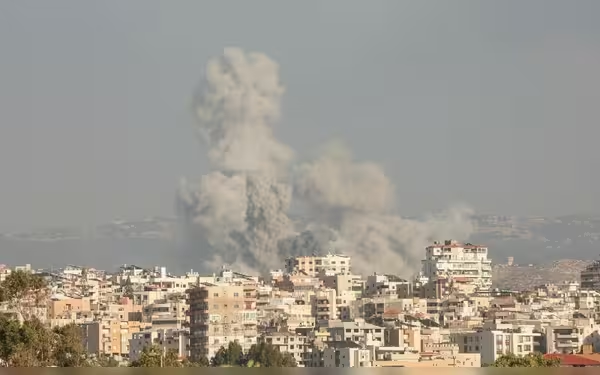Saturday, November 16, 2024 05:58 PM
Israeli Airstrikes Kill 274 in Lebanon's Hezbollah Strongholds
- 274 dead, including 21 children, in Israeli airstrikes.
- 1,024 injured, creating a humanitarian crisis.
- Hezbollah vows to continue fighting against Israel.
 Image Credits: dawn
Image Credits: dawnIsraeli airstrikes on Hezbollah strongholds in Lebanon result in 274 deaths, escalating the humanitarian crisis amid ongoing conflict.
The ongoing conflict between Israel and Hezbollah has escalated dramatically, resulting in a tragic loss of life and widespread destruction. On Monday, Israeli airstrikes targeted Hezbollah strongholds in Lebanon, leading to a staggering death toll of 274 individuals, including 21 children. This marks one of the bloodiest days in nearly a year of cross-border clashes, as reported by Lebanese Health Minister Firass Abiad. The violence has not only claimed lives but has also displaced thousands of families from their homes, creating a humanitarian crisis in the region.
According to Minister Abiad, the strikes have left 1,024 people injured, with many requiring treatment in local hospitals. The situation has become increasingly dire, with reports indicating that approximately 5,000 individuals have been wounded in less than a week due to the ongoing Israeli attacks. The conflict, which reignited following Hamas's assault on Israel, has drawn Hezbollah and other Iran-backed groups into the fray, intensifying the violence along Israel's northern border.
The Israeli military has claimed responsibility for striking around 800 Hezbollah targets, emphasizing its commitment to conducting extensive aerial operations against what it describes as terrorist threats. Rear Admiral Daniel Hagari, an Israeli military spokesman, has urged civilians in Lebanon to evacuate areas linked to Hezbollah, warning that strikes will continue in the near future. This has led to a mass exodus of people from their homes, with many seeking refuge in makeshift shelters.
In the southern Lebanese village of Zawtar, residents like Wafaa Ismail have expressed their despair, stating, "We sleep and wake up to bombardment … that’s what our life has become." The fear and uncertainty have driven hundreds to flee to safer locations, with reports of people camping in the streets and schools being converted into shelters.
Hezbollah, a significant political and military force in Lebanon, has vowed to continue its fight against Israeli forces, framing its actions as support for its Palestinian ally, Hamas. The group’s deputy chief, Naim Qassem, has declared that Hezbollah is prepared for "all military possibilities" as tensions continue to rise. This ongoing cycle of violence has left many questioning the future of peace in the region.
As the conflict unfolds, world leaders are calling for restraint from both sides. Lebanese Prime Minister Najib Mikati has urged the United Nations and global powers to intervene and prevent further destruction of Lebanese towns and villages. Meanwhile, U.S. President Joe Biden has expressed his commitment to preventing a wider war from breaking out, emphasizing the need for diplomatic solutions.
The situation remains fluid, with the potential for further escalation looming. As civilians bear the brunt of the conflict, the international community watches closely, hoping for a resolution that can bring lasting peace to a region long plagued by violence. The human cost of this conflict is immeasurable, and it serves as a stark reminder of the urgent need for dialogue and understanding among all parties involved.













